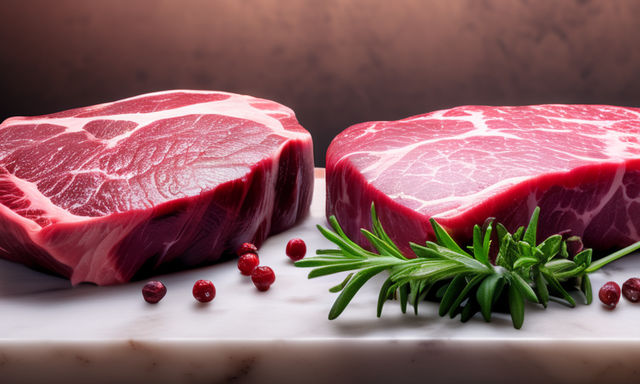Is Red Mead Bad for You?
The consumption of red meat has long been a subject of heated debates in the realm of nutrition and health. While red meat like beef, pork, and lamb can be a valuable source of high-quality protein and essential nutrients such as iron, zinc, and vitamin B12, concerns have been raised about its potential health risks. This article delves into the complexities surrounding red meat, examining both its nutritional benefits and the associated health concerns, to provide a nuanced understanding of its role in a balanced diet.
What Constitutes Red Meat?
Red meat refers to the meat of mammals, which is typically red when raw. This category includes beef, lamb, pork, veal, and venison, among others. It's distinguished from white meat, such as poultry and fish, by high levels of myoglobin, a protein found in the muscle of these animals.
Nutritional Profile of Red Meat
Red meat is lauded for its nutrient density, offering several vital components for bodily functions:
- - Protein: Essential for muscle repair, growth, and overall body function.
- - Iron: Particularly heme iron in red meat, is more easily absorbed by the body compared to non-heme iron found in plant sources, making it crucial for preventing anemia.
- - Vitamin B12: Vital for nerve function and the production of DNA and red blood cells, B12 is found predominantly in animal products.
- - Zinc: Important for immune function, wound healing, and DNA synthesis.
Health Concerns Associated with Red Meat
Despite its nutritional benefits, the consumption of red meat has been linked to several health risks, prompting cautionary advice from health experts:
- - Cardiovascular Disease: Some studies suggest that high consumption of red meat, especially processed forms like sausages and bacon, can increase the risk of heart disease, potentially due to saturated fats and high sodium levels.
- - Cancer: The International Agency for Research on Cancer (IARC), a part of the World Health Organization (WHO), has classified processed meat as a carcinogen and red meat as a probable carcinogen. The concern is primarily linked to chemicals formed during meat processing or cooking at high temperatures.
- - Type 2 Diabetes: Research indicates a correlation between regular consumption of red and processed meat and an elevated risk of developing type 2 diabetes.
Moderation and Choice: Key to a Balanced Diet
Given the mixed evidence, moderation and choice become crucial when including red meat in your diet. Opting for lean cuts, limiting processed meats, and balancing red meat consumption with a variety of other protein sources, including fish, poultry, legumes, and nuts, can form part of a healthy, balanced diet.
Introducing the 7-Day Red Meat-Free 2000 kcal Plan
For those looking to explore a diet that limits red meat while ensuring balanced nutrition, we are excited to introduce our 7-Day Red Meat-Free 2000 kcal Plan. This carefully curated plan offers a diverse array of meals, rich in nutrients and flavors, without relying on red meat as a protein source.
Highlights of the 7-Day Plan:
- 1. Diverse Protein Sources: Enjoy a variety of protein-rich foods, including poultry, fish, legumes, and dairy, ensuring your body receives all essential amino acids.
- 2. Balanced Nutrition: Each day is meticulously planned to provide a balanced intake of carbohydrates, fats, and proteins, aligned with a 2000 kcal daily energy goal.
- 3. Whole Foods: Emphasis on whole, unprocessed foods ensures you're not only avoiding red meat but also enhancing overall diet quality with fruits, vegetables, and whole grains.
- 4. Convenience and Flavor: The plan is designed with both taste and convenience in mind, featuring easy-to-prepare meals that don't compromise on flavor.
Whether you're considering reducing your red meat intake for health reasons or simply looking to diversify your diet, our 7-Day Red Meat-Free 2000 kcal Plan is an excellent starting point. It's an opportunity to discover new dishes and flavors while nourishing your body with everything it needs to thrive.
For more information and to embark on your red meat-free journey, visit 7-Day Red Meat-Free 2000 kcal Plan.

Conclusion
Incorporating red meat into a healthy, balanced diet requires careful consideration of the type, quantity, and preparation methods. By choosing lean cuts, limiting processed meats, and incorporating a wide array of other protein sources, you can enjoy the benefits of red meat without overexposure to its potential risks. Our 7-Day Red Meat-Free 2000 kcal Plan is designed to help you explore the possibilities of a diet without red meat, ensuring you enjoy diverse, nutritious, and delicious meals every day.
Disclaimer: This article is for informational purposes only and does not constitute medical advice. The content is not intended to be a substitute for professional medical advice, diagnosis, or treatment. Always seek the advice of your physician or other qualified health providers with any questions you may have regarding a medical condition or dietary changes.
References
1. Giromini C, Givens DI. Benefits and Risks Associated with Meat Consumption during Key Life Processes and in Relation to the Risk of Chronic Diseases. Foods. 2022 Jul 12;11(14):2063. doi: 10.3390/foods11142063. PMID: 35885304; PMCID: PMC9318327.
2. McAfee, A., McSorley, E. M., Cuskelly, G., Moss, B., Wallace, J., Bonham, M. P., & Fearon, A. M. (2010). Red meat consumption: An overview of the risks and benefits. Meat Science, 84(1), 1–13. https://doi.org/10.1016/j.meatsci.2009.08.029
3. Maloney, B. (2019, September 23). What’s in the meat? The Pros and Cons of Eating red Meat by Keilah Martinez. Marque Medical. https://marquemedical.com/whats-in-the-meat-the-pros-and-cons-of-eating-red-meat-by-keilah-martinez-2/
4. NHS (2023, April 4). Meat in your diet. nhs.uk. https://www.nhs.uk/live-well/eat-well/food-types/meat-nutrition/
5. WCRF International. (2022, April 28). Limit red and processed meat - WCRF International. https://www.wcrf.org/diet-activity-and-cancer/cancer-prevention-recommendations/limit-red-and-processed-meat/
6. Meatless meals: The benefits of eating less meat. (2022, December 9). Mayo Clinic. https://www.mayoclinic.org/healthy-lifestyle/nutrition-and-healthy-eating/in-depth/meatless-meals/art-20048193
7. Wyness L. The role of red meat in the diet: nutrition and health benefits. Proceedings of the Nutrition Society. 2016;75(3):227-232. doi:10.1017/S0029665115004267
Ready to level-up?
Create meal plans 10x faster, follow up with your clients through our mobile app, and never struggle with meal planning or recipe management again.
